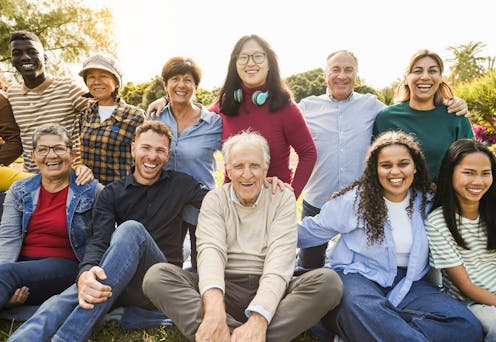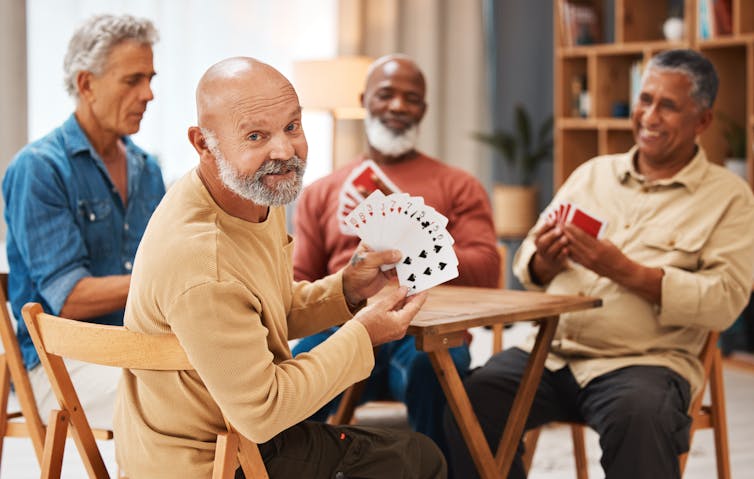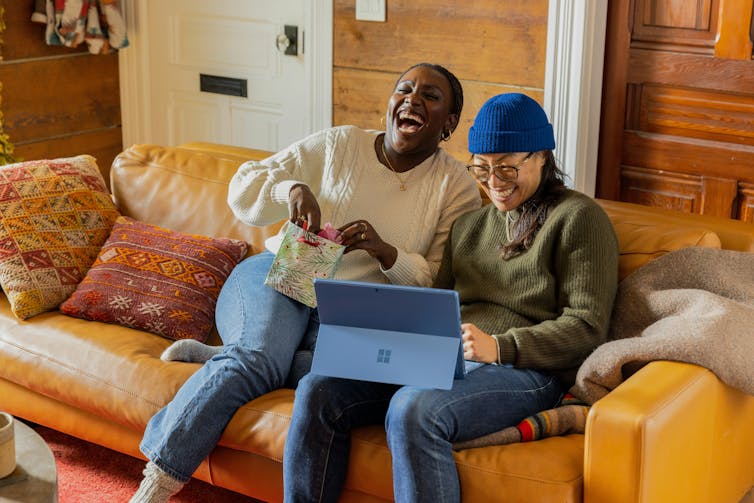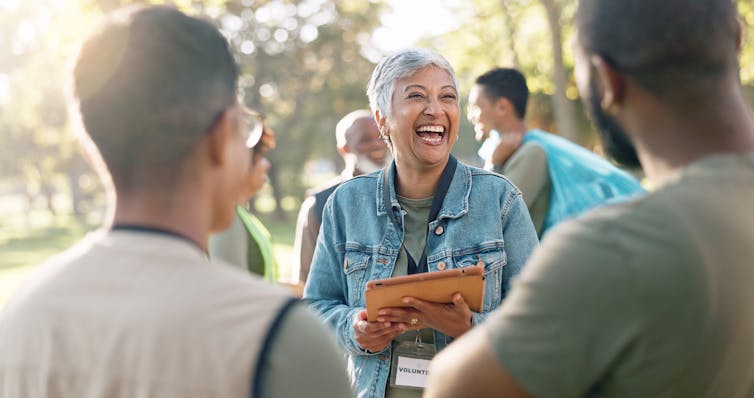
You’ve probably heard that human beings are “social animals.” That doesn’t just mean we tend to interact with each other; it means that as a species, we need social connection to thrive, and isolation can be harmful to our health.
In scientific research, the term used for social animals is “eusocial,” which means they live in co-operative groups characterized by overlapping generations, division of labour and co-operative care of offspring.
Sociability is a continuum across species, with other classes of animals being described as:
- Solitary (animals that live independently, such as most tigers or leafcutter bees),
- Subsocial (animals that provide care for their offspring but do not live in long-term co-operative groups, such as some beetles or alligators),
- Communal (animals that share a nesting site but rear their offspring independently, such as certain species of sweat bees), or
- Quasisocial (animals that share a nest and co-operate in brood care but lack division of reproductive roles, such as some orchid bees).
In this way, sociability is similar to describing some animals as carnivores (meaning they rely on only meat), others as herbivores (meaning they rely solely on plant-based diets) and others as omnivores (meaning they eat both). But while human beings can make choices about what they eat, we all have a universal need for social connection.
Read more:
Loneliness could kill you
Table of Contents
The consequence of social disconnection
Decades of research have shown that when humans lack social connection, they experience profound and adverse health impacts. This evidence dates back to the earliest human health studies among widows, war wives and bachelors, each of which show significantly shorter lifespans for those with reduced social connections.
In fact, the earliest piece of empirical sociology showed that our social worlds were a driving risk factor for suicide and contemporary research shows that among all the modifiable risk factors for depression, the most important one is having someone to confide in.
All this evidence tells us that loneliness is as harmful or even more harmful than many traditional risk factors for poor health, including poor air quality, sedentary living and obesity, binge drinking and smoking (the last of which is widely recognized as the leading cause of preventable death).
Now, you might think if you’re an introvert or somebody with social anxiety, you don’t need social connection. You might have an incredible capacity for solitude. Maybe you even feel like you prefer to be alone and are immune to loneliness. However, while people certainly do vary in how much social connection we need, research suggests that social isolation itself, regardless of experiences of loneliness, is harmful.
Everyone needs social connection and research even shows that more introverted people experience worse health outcomes when they fail to have these needs met. This means people need social connection whether they like it or not.
Why social connection can be challenging
Most of us, however, have the opposite problem: we want more social connection than we’re able to get. The need to belong is a universal desire.
It was only a few decades ago that we had large-scale social gatherings that ensured we all got time in our schedules together: religious services on weekends, community barbecues, date nights.

(Shutterstock)
But social relationships have become more difficult in the fast-moving and fractured societies we now live in. We spend a lot of time in cars, cubicles and tiny apartments. These environments have been described by some researchers as “lonelygenic” which means they contribute to our feelings of loneliness.
Additionally, we are isolated because social connection can be intimidating. We’ve become more anxious, we worry too much about what others think of us and we’re sensitive to social rejection — all of which are hallmarks of the social anxiety that keep us from getting the social connection we need.
Furthermore, our culture instils in us a fear of burdening others and we’ve become more and more individualistic and siloed. Our social muscles aren’t getting the exercise they need.
Then there are the economic pressures and responsibilities that fill our schedules. The cost of living crisis, pandemics and the explosion of distracting technologies can make it more difficult to connect. A typical special occasion might be spent at home with food delivered and streaming TV instead of company.
These conditions are not meeting our needs. Children are experiencing record-breaking prevalence of mental health crises, health-care costs are skyrocketing while life expectancy is in a slump. Our society has never been more polarized, and many are losing faith in democracy.
We need to turn these trends around.
Recommendations for solving the problem

(Shutterstock)
For all these reasons and more, three years ago I and my team of public health researchers, social scientists and social psychologists set out to develop new national public health guidelines for social connection. To do so, we convened approximately 100 of the world’s leading experts on social connection and loneliness, summarized more than 4,500 academic research papers into 50 evidence briefs that would inform our guidelines, documented dozens of case studies illustrating what works and identified dozens of resources to support their implementation.
The guidelines are organized into two sets: six for individuals, similar to food and exercise guidelines, and six for policy and decision makers within organizations, communities and governments to guide them in leading the way to a healthier, more connected society.
Guidelines for individuals

(Surface/Unsplash)
Our individual guidelines emphasize that loneliness is like hunger and thirst: it’s a neurobiological process designed to motivate us to get our essential social nutrients. However, unlike food guidelines, our recommendations do not prescribe how many or what types of friends you have. Rather, they provide essential advice to help you figure out what you need.
-
Make social connection a priority throughout your life
-
Cultivate social confidence in yourself and others
-
Build a strong social network with a variety of kinds of relationships
-
Maintain and deepen your relationships with others
-
Seek out face-to-face interactions and use technology wisely
Guidelines for communities

(Shutterstock)
Accompanying our messages for individuals, the community guidelines emphasize that social connection takes two or more people. It’s not something we can do alone. People face very really challenges to meeting their social connection. If we’re going to overcome these challenges, the evidence is clear: we need to work together as communities.
-
Promote awareness of the importance of social connection
-
Foster healthy social and emotional development
-
Make social connection a priority in policies and practices
-
Design environments for connection and invest in social events, activities and programs
-
Improve accessibility and inclusion for all people
-
Measure and make progress towards improving social well-being
Toward a more connected future
These guidelines are intended as a critical component of the future of public health.
Like food and exercise guidelines, their goal is to promote investment in a critically under-appreciated determinant of our well-being.
Following these guidelines may not be easy, but evidence suggests they will make us healthier and happier — especially if we’re not trying to do it alone.
![]()
Kiffer George Card is an Assistant Professor in the Faculty of Health Sciences at Simon Fraser University, a Michael Smith Health Research BC Scholar, and a Blanche and Charlie Beckerman Public Health Innovation Scholar. He receives funding from the Social Sciences and Humanities Research Council, The Canadian Institutes of Health Research, and the Health Research BC. He is also an affiliate of The Canadian Alliance for Social Connection and Health and the GenWell Project.























